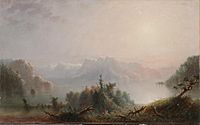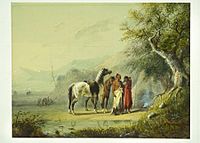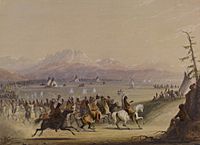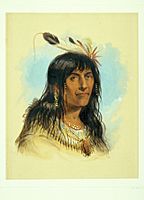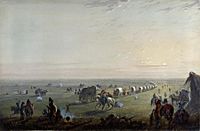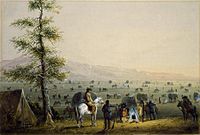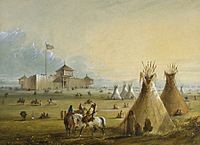Alfred Jacob Miller facts for kids
Quick facts for kids
Alfred Jacob Miller
|
|
|---|---|
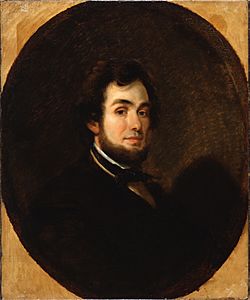
Self-Portrait, c. 1850
|
|
| Born | January 2, 1810 Baltimore, Maryland
|
| Died | June 26, 1874 (aged 64) Baltimore, Maryland
|
| Nationality | American |
| Known for | Painting |
|
Notable work
|
The Trapper's Bride The Lost Greenhorn Attack by Crows Breakfast at sunrise and others |
Alfred Jacob Miller (born January 2, 1810 – died June 26, 1874) was an American artist. He is famous for his paintings of trappers and Native Americans. These artworks show life in the western United States during the fur trade era. He also painted many portraits and everyday scenes in and around Baltimore.
Contents
A Painter's Life
Alfred Jacob Miller was born in Baltimore, Maryland. He was the oldest of nine children. His father was a merchant and also ran a tavern. Alfred went to a private school in Baltimore. He may have learned his first art lessons from Thomas Sully, a well-known painter.
Studying Art in Europe
In 1832, Alfred traveled to Paris, France. His family and art supporters helped him pay for the trip. He studied drawing at a famous art school called the École des Beaux-Arts. He also copied paintings at the Louvre Museum.
In 1833, he went to Italy. He visited cities like Bologna, Florence, and Venice. He then settled in Rome to continue his studies. While in Europe, he became friends with a Danish sculptor named Bertel Thorvaldsen. He also studied with a French painter, Horace Vernet.
Adventures in the American West
Alfred returned to Baltimore in 1834. He opened his own art studio. He painted portraits and copies of old master paintings. In 1837, he moved to New Orleans. This city was a good place for artists to find work.
In New Orleans, he met Sir William Drummond Stewart. Stewart was a Scottish nobleman and adventurer. He hired Miller to join him on a hunting trip to the Rocky Mountains.
That same year, they traveled far into the West. They went with people from the American Fur Company. They explored places like Fort William and the Green River. Miller drew sketches of everything he saw.
Sharing His Art
After his trip, Miller returned to New Orleans. He turned his sketches into beautiful watercolor and oil paintings. These paintings showed scenes from the hunting journey. They also showed the lives of Native Americans in the West.
In 1838, Miller held an exhibition of his work in New Orleans. In 1840, he traveled to Scotland with his paintings. He stayed at Stewart's Murthly Castle. Many of his commissioned artworks were displayed there.
After spending a year in Scotland and another in London, Miller came back to Baltimore in 1842. He became a respected portrait artist in the city. He continued to paint until he passed away on June 26, 1874.
Famous Paintings
Alfred Jacob Miller's paintings capture the spirit of the American West. They show trappers, Native Americans, and the vast landscapes.
-
Camp Scene (Sioux), 1858–1860, Walters Art Museum
Images for kids
 | Delilah Pierce |
 | Gordon Parks |
 | Augusta Savage |
 | Charles Ethan Porter |


